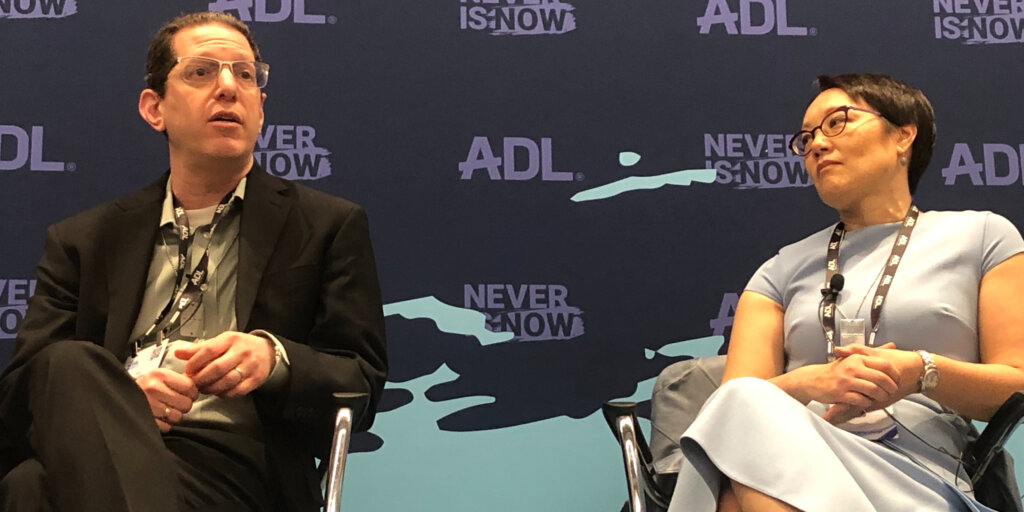New documentary to show never-before-seen footage of gunman taking Texas synagogue hostage
The soon-to-be released film includes footage of the gunman brandishing his weapon and Rabbi Charlie Cytron-Walker trying to calm him
A documentary about the 2022 hostage crisis at a synagogue in Colleyville, Texas, is in final production, and includes extensive video and audio from inside of Congregation Beth El, where a man held Rabbi Charlie-Cytron Walker and several congregants at gunpoint for 11 hours.
The video, from the synagogue’s own cameras, shows — among other images — the captives in prayer shawls, their hands raised above their heads as the gunman brandishes his weapon. It also shows the moment of their escape.
“I love death more than you love life,” the gunman is heard telling the rabbi in the film, several minutes of which were shown to an audience on Thursday at the Anti-Defamation League’s annual conference in New York.
That phrase, director Dani Menkin told hundreds at the conference, stunned him, as has the rabbi’s insistence, ever since the incident, that Jews cannot shut themselves off from others, even as rising antisemitism may make them want to.
“I’m not going to stop loving the stranger,” Menkin said, quoting Cytron-Walker. “Those words brought me to this movie.”

Cameras on the bima
It was the rabbi’s own welcoming of the gunman — who said he needed shelter that Shabbat morning — that allowed him to enter the small town synagogue, northeast of Fort Worth, Texas.
The film, called “Colleyville,” shows how the gunman, British citizen Malik Faisal Akram, turned on the rabbi, shouting obscenities. He said he had bombs, though he didn’t, and threatened to kill many more Jews than the few in Beth El that morning.
Cytron-Walker threw a chair at Akram at a moment when he thought the distraction would give the captives just enough time to escape. All the hostages survived. Cytron-Walker’s heroic act made him, for a time, one of the most famous rabbis in America.
The gunman, believing in antisemitic conspiracy theories, told Cytron-Walker to call Rabbi Angela Buchdahl of New York’s Central Synagogue, because he believed she had the power to free a convicted terrorist serving time in a prison 20 minutes from Colleyville.
The 80-minute film will be released this spring or summer and will be shown at film festivals. It draws on several sources of video, including some from Facebook Live and Zoom cameras that streamed services for congregants who did not attend services in person.
With the COVID-19 pandemic still a grave threat, many congregants chose to watch services from home that morning. On a typical Saturday during the pandemic, a few dozen congregants might tune in. But as word of the hostage-taking spread, thousands of people around the world, including law enforcement, went online and watched the situation unfold in real time.
“Colleyville” also includes previously unreleased video from the synagogue’s security cameras.
Menkin, an established Israeli-born director who lives in Los Angeles, said the film will cost less than $1 million to make, but that he still needs to raise about $250,000 more to finish the project. He asked the audience to donate to his film company to help him show the film to a wider audience.
‘I’ve only been taken hostage once’
Cytron-Walker, who was, with Buchdahl, part of the panel on the film at the ADL conference, asked the audience of several hundred how many had taken a security training course like the one he had taken months before the incident. He credits that training for preparing him to take action when he felt the gunman was readying to shoot him and two other hostages.
By a show of hands, less than half had taken such a course. Cytron-Walker, now rabbi at Temple Emanuel in Winston-Salem, North Carolina, and a consultant to the ADL, shook his head. “C’mon people, we have to know how to do this.”
Buchdahl, described the call she received from Cytron-Walker during the crisis, and recalled him saying “not great” when she asked him how he was. When he explained what the gunman thought she, as a rabbi, could make happen, she said she was struck that he actually believed conspiracy theories about Jews controlling the American government.
“This is the first time I understood how dangerous the trope of Jewish power is,” said Buchdahl, who had never met Cytron-Walker before the incident. He found her phone number in a directory of Reform rabbis.
Though about 250 law enforcement officers had surrounded the synagogue and were trying to negotiate their release, Cytron-Walker and the hostages saved themselves — running for the exit after the rabbi threw the chair. The FBI then killed Akram.
Buchdahl said the documentary will come out at the right time — after Oct. 7 and during the Israel-Hamas war, as conspiracy theories about Jews proliferate.
“This is about Israel fighting an extremist ideology in the world,” said Buchdahl.
Cytron-Walker, while advising Jews to take security seriously, and noting that his own synagogue had in the past few years increased its security budget from about $15,000 to $80,000 annually, also asked them to put antisemitism in perspective.
“I have led thousands of services. I’ve only been taken hostage once,” he said, and then turned to Buchdahl. “You’ve led thousands of services and you’ve never even been taken hostage.”















